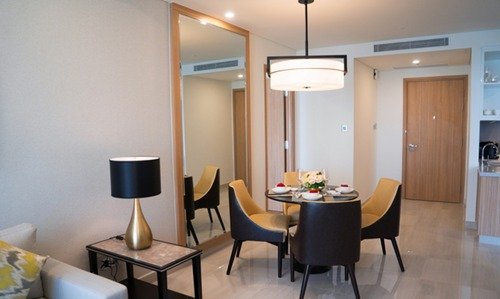Serviced Apartments vs. Hotels: Which One Works Better for Long Stays?
Whether you’re relocating for work or going on an extended vacation, finding the right accommodation for a long-term stay can be challenging. Hotels have been the go-to option for decades. But a newer, modern option has gained popularity: Serviced apartments.
But how exactly do serviced apartments differ from traditional hotels? And which one works best for long stays? Let’s break it down one question at a time!

Source: Freepik
What are Serviced Apartments?
A serviced apartment is a self-contained, fully-furnished living space. It brings that “home away from home” feeling. Serviced apartments are excellent for travellers who plan to stay for a few weeks or months and want more than just a bedroom.
Serviced apartments in Singapore typically offer the following:
- One or more bedrooms
- Kitchen (equipped with dishwasher, utensils, microwave, coffee maker, toaster, and kitchen roll)
- Living or dining area
- One or more bathrooms (equipped with soap, shampoo, conditioner, and toilet paper)
- Laundry facilities
The “serviced” aspect of these apartments means services such as housekeeping, maintenance, utilities, and sometimes even concierge support. Some high-end serviced apartments even come with on-site gyms, pools, and lounges.
What Do Hotels Offer?
Before moving forward, let’s recap what traditional hotels offer.
An average hotel room offers a bed to sleep, a TV, a closet, and an en-suite bathroom. Some rooms can have a chair and a desk, a mini fridge, and a small couch. You can also enjoy daily housekeeping, room service, laundry service, 24/7 front desk support, and concierge assistance.
Comfort and Space
The biggest difference between serviced apartments and hotel rooms is the available space.
Traditional hotel rooms are primarily designed for short-term stays, so they can feel a little cramped. This isn’t the case with a serviced apartment. It is spacious – you can eat at the dining table, watch TV on the sofa, and cook in the spacious kitchen. Guests can even store ingredients, drinks, and meals.
Flexibility
Plans change, and before you know it, a two-week business trip turns into a three-month stay. A hotel might not be able to accommodate your request for an extension. In comparison, a serviced apartment offers more flexible lease terms. You can even adjust your length of stay without major penalties.
This is why serviced apartments are popular among business travellers, digital nomads, and of course, long-term tourists.
Privacy
Let’s be real — privacy is a necessity when you’re staying in a foreign country for an extended period of time. Hotels have housekeeping and plenty of guests coming and going, which is why they often feel less private. The constant service can feel intrusive and restrictive.
With a serviced apartment, you have more privacy. You can cook your own meals, do your laundry whenever you want, and set your own daily routine.
Bottom Line
There is no one-size-fits-all approach. Both hotels and serviced apartments have their pros and cons. But when it comes to long-term stays, serviced apartments take the lead. They ensure a private, flexible, and customizable experience.


